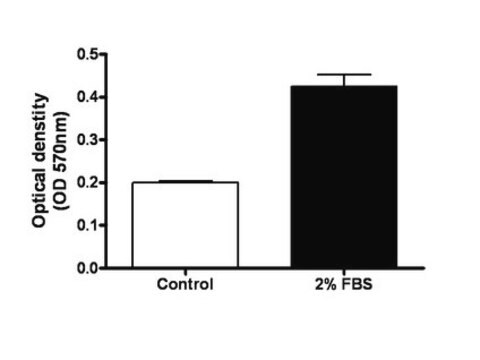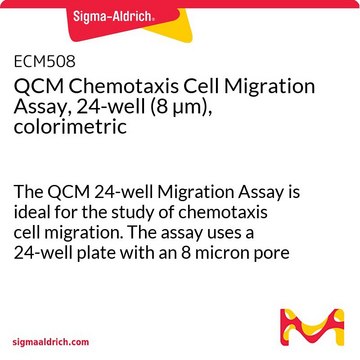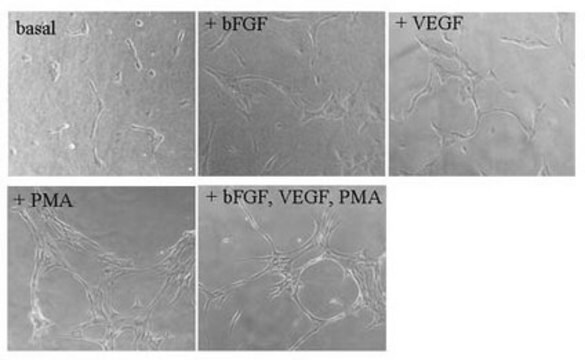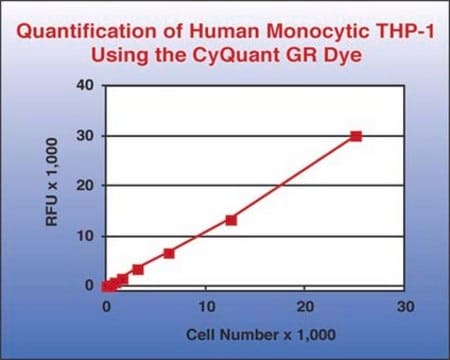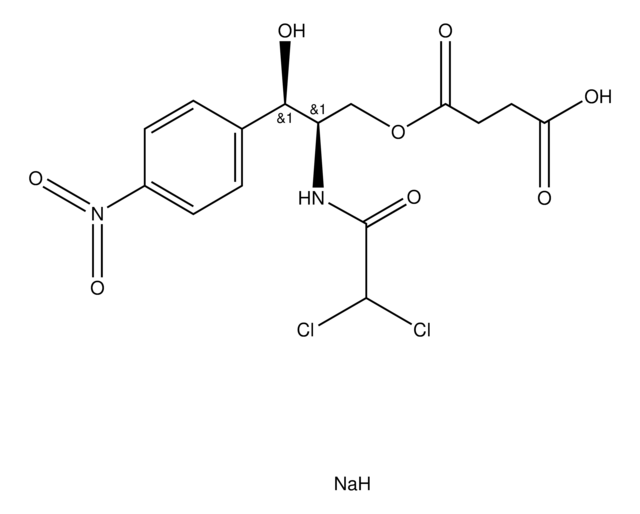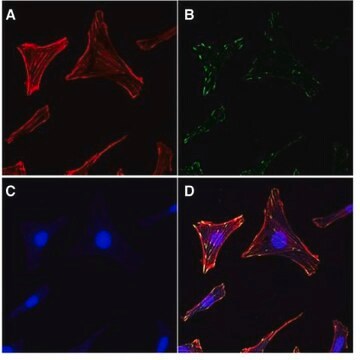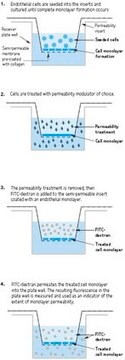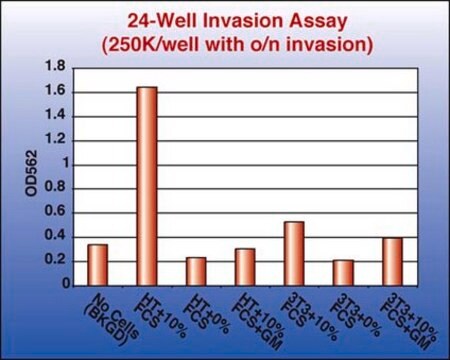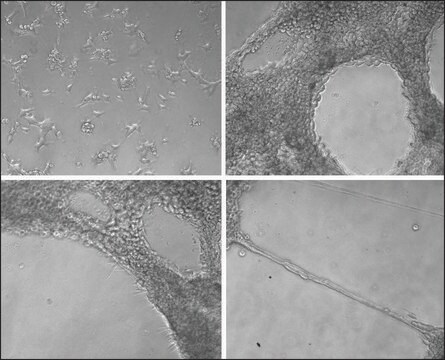ECM200
QCM 3 µm Endothelial Cell Migration Assay Fibronectin, Colorimetric
Sinonimo/i:
Endothelial migration assay
Autenticatiper visualizzare i prezzi riservati alla tua organizzazione & contrattuali
About This Item
Codice UNSPSC:
12352207
eCl@ss:
32161000
NACRES:
NA.84
Prodotti consigliati
Produttore/marchio commerciale
Chemicon®
QCM
Livello qualitativo
tecniche
cell based assay: suitable
Metodo di rivelazione
colorimetric
fluorometric
Condizioni di spedizione
wet ice
Descrizione generale
Also available: Cell Comb Scratch Assay! Get biochemical data from a scratch assay!Click Here
Introduction
Angiogenesis is a fundamental process involving the growth of new blood vessels from pre-existing vessels. It is important in development and wound healing, as well as pathologic diseases such as diabetic retinopathy and cancer. During angiogenesis, endothelial cells need to move out of existing vessels, migrate into new areas, proliferate and assemble into new capillaries. The migration of endothelial cells is regulated by many angiogenic factors and anti-angiogenic factors. It is critical for researchers to understand the mechanisms of endothelial cell migration.
Millipore′s 3 μm QCM Endothelial Cell Migration Assay – Fibronectin, Colorimetric provides a quick and efficient system to study the ability of compounds to induce or inhibit endothelial cell migration. This assay also allows screening of pharmacological agents, evaluation of integrins or other adhesion receptors responsible for endothelial cell migration, analysis of gene function in transfected cells, and determination of ECM protein involvement in cell movement.
This versatile assay permits counting of individual migratory cells, and, more importantly, allows quantitative analysis by optical density (OD) using a standard microplate reader. This convenient assay allows large scale screening and quantitative comparison of multiple samples and includes individual migration controls for each sample.
Introduction
Angiogenesis is a fundamental process involving the growth of new blood vessels from pre-existing vessels. It is important in development and wound healing, as well as pathologic diseases such as diabetic retinopathy and cancer. During angiogenesis, endothelial cells need to move out of existing vessels, migrate into new areas, proliferate and assemble into new capillaries. The migration of endothelial cells is regulated by many angiogenic factors and anti-angiogenic factors. It is critical for researchers to understand the mechanisms of endothelial cell migration.
Millipore′s 3 μm QCM Endothelial Cell Migration Assay – Fibronectin, Colorimetric provides a quick and efficient system to study the ability of compounds to induce or inhibit endothelial cell migration. This assay also allows screening of pharmacological agents, evaluation of integrins or other adhesion receptors responsible for endothelial cell migration, analysis of gene function in transfected cells, and determination of ECM protein involvement in cell movement.
This versatile assay permits counting of individual migratory cells, and, more importantly, allows quantitative analysis by optical density (OD) using a standard microplate reader. This convenient assay allows large scale screening and quantitative comparison of multiple samples and includes individual migration controls for each sample.
Applicazioni
The Millipore QCM 3 μm Endothelial Cell Migration Assay – Fibronectin, Colorimetric is ideal for the study of endothelial cell migration in response to an angiogenic stimulus. The quantitative nature of this assay is especially useful for large scale screening of pharmacologic agents. BSA-coated control chambers provide an appropriate migration control. The 3 μm pore size in this assay is optimal for endothelial cells such as HUVEC, but not sufficient for fibroblast migration. The Millipore QCM 3 μm Endothelial Cell Migration Assay – Fibronectin, Colorimetric assay is intended for research use only; not for diagnostic applications.
Each kit provides sufficient materials for the evaluation of 12 samples.
Each kit provides sufficient materials for the evaluation of 12 samples.
Confezionamento
Sufficient for 12 assays
Componenti
1. Fibronectin Test Plate: One 24-well culture plate, containing 12 human FN-coated Boyden chambers, sufficient for the evaluation of 12 test samples.
2. BSA Control Plate: One 24-well culture plate, containing 12 BSA-coated Boyden chambers, sufficient for the evaluation of 12 controls.
3. Cell Stain Solution: One vial - 10 mL
4. Extraction Buffer: One vial - 10 mL
5. 24-Well Stain Extraction Plate
6. 96-Well Stain Quantitation Plate
7. Swabs: 50 ea
8. Forceps: 1 pair
2. BSA Control Plate: One 24-well culture plate, containing 12 BSA-coated Boyden chambers, sufficient for the evaluation of 12 controls.
3. Cell Stain Solution: One vial - 10 mL
4. Extraction Buffer: One vial - 10 mL
5. 24-Well Stain Extraction Plate
6. 96-Well Stain Quantitation Plate
7. Swabs: 50 ea
8. Forceps: 1 pair
Stoccaggio e stabilità
Store kit materials at 2° to 8°C for up to their expiration date. Do not freeze.
Note legali
Accutase is a registered trademark of Innovative Cell Technologies, Inc.
CHEMICON is a registered trademark of Merck KGaA, Darmstadt, Germany
Esclusione di responsabilità
Unless otherwise stated in our catalog or other company documentation accompanying the product(s), our products are intended for research use only and are not to be used for any other purpose, which includes but is not limited to, unauthorized commercial uses, in vitro diagnostic uses, ex vivo or in vivo therapeutic uses or any type of consumption or application to humans or animals.
Avvertenze
Danger
Indicazioni di pericolo
Consigli di prudenza
Classi di pericolo
Eye Irrit. 2 - Flam. Liq. 2
Codice della classe di stoccaggio
3 - Flammable liquids
Classe di pericolosità dell'acqua (WGK)
WGK 3
Certificati d'analisi (COA)
Cerca il Certificati d'analisi (COA) digitando il numero di lotto/batch corrispondente. I numeri di lotto o di batch sono stampati sull'etichetta dei prodotti dopo la parola ‘Lotto’ o ‘Batch’.
Possiedi già questo prodotto?
I documenti relativi ai prodotti acquistati recentemente sono disponibili nell’Archivio dei documenti.
I clienti hanno visto anche
Positive influence of AP-2alpha transcription factor on cadherin gene expression and differentiation of the ocular surface.
Judith A West-Mays, Jeremy M Sivak, Steve S Papagiotas, Jennifer Kim, Timothy Nottoli et al.
Differentiation null
Bingchen Han et al.
Molecular therapy : the journal of the American Society of Gene Therapy, 30(2), 672-687 (2021-07-19)
Triple-negative breast cancer (TNBC) has a high propensity for organ-specific metastasis. However, the underlying mechanisms are not well understood. Here we show that the primary TNBC tumor-derived C-X-C motif chemokines 1/2/8 (CXCL1/2/8) stimulate lung-resident fibroblasts to produce the C-C motif
Maximilian Seles et al.
Cancers, 12(5) (2020-05-14)
POU3F3 adjacent non-coding transcript 1 (PANTR1) is an oncogenic long non-coding RNA with significant influence on numerous cellular features in different types of cancer. No characterization of its role in renal cell carcinoma (RCC) is yet available. In this study
Il team dei nostri ricercatori vanta grande esperienza in tutte le aree della ricerca quali Life Science, scienza dei materiali, sintesi chimica, cromatografia, discipline analitiche, ecc..
Contatta l'Assistenza Tecnica.